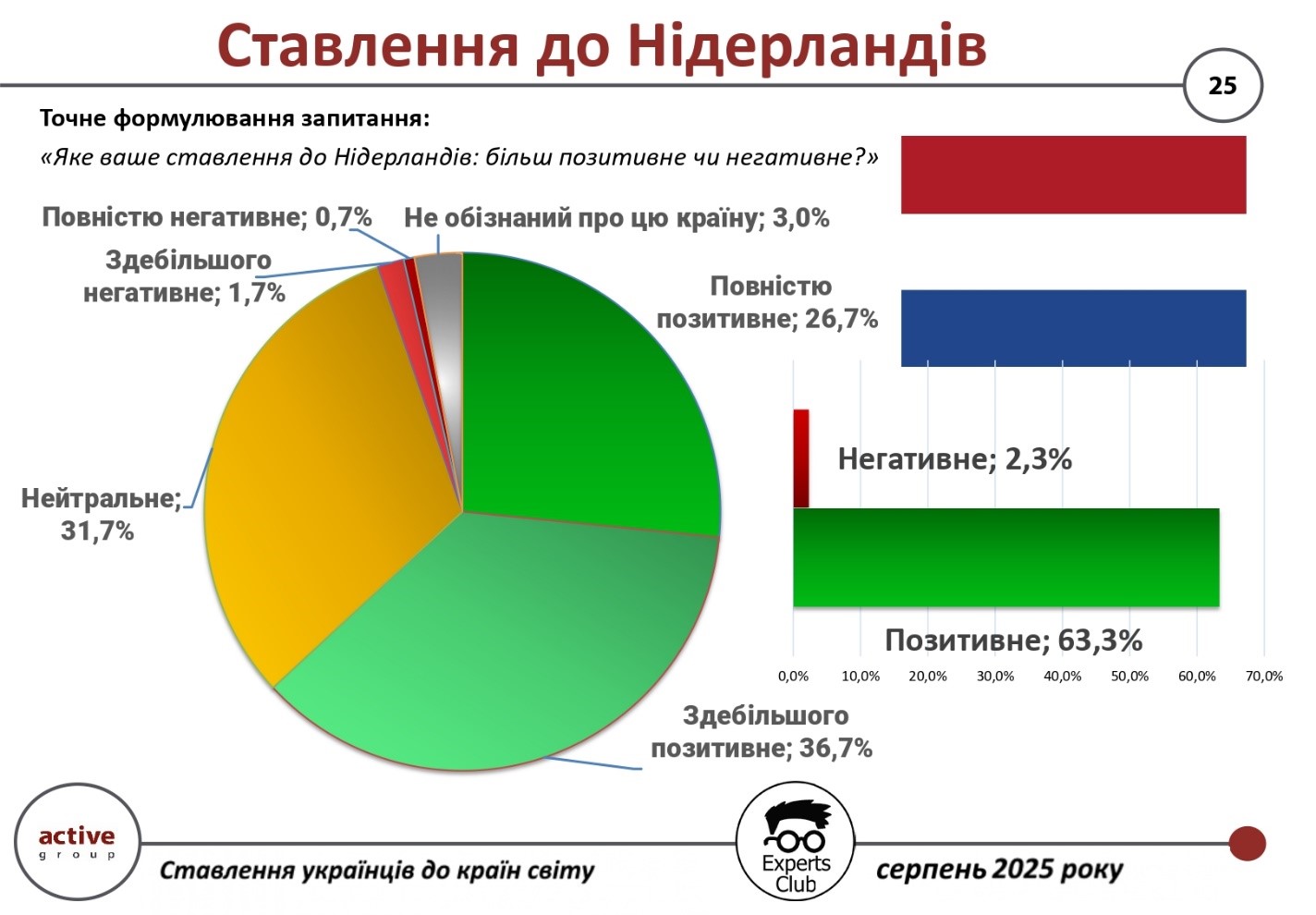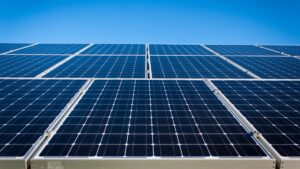

The Netherlands ranks high in the rating of Ukrainians’ sympathies, demonstrating a consistently positive image among citizens. This is evidenced by the results of an all-Ukrainian survey conducted by Active Group in cooperation with the Experts Club information and analytical center in August 2025.
According to the study, 63.3% of Ukrainians have a positive attitude towards the Netherlands (36.7% – mostly positive, 26.7% – completely positive). Only 2.3% of respondents expressed a negative attitude (1.7% – mostly negative, 0.7% – completely negative). Another 31.7% of citizens are neutral, and 3.0% said they are not sufficiently aware of this country.
“The Netherlands is one of Ukraine’s most important trading partners in the European Union. In the first half of 2025, the volume of bilateral trade amounted to almost $ 1.48 billion, of which exports from Ukraine amounted to more than $ 918 million and imports from the Netherlands – $ 561 million. The positive balance of $357 million is evidence that Ukraine has favorable positions in cooperation with this country,” said Maksym Urakin, founder of Experts Club.
In his turn, Alexander Poznyi, co-founder of Active Group, emphasized that the positive attitude of Ukrainians is complex.
“The Netherlands is known as a country that supports Ukraine in the international arena and participates in humanitarian and financial assistance programs. At the same time, long-term cultural and educational contacts strengthen the positive image of this country in Ukrainian society. That is why almost two-thirds of citizens show favorable attitudes, and the negative segment remains minimal,” he added.
The survey was part of a broader study of international sympathies and antipathies of Ukrainians in the current geopolitical environment.
The full video can be viewed here:
https://www.youtube.com/watch?v=YgC9TPnMoMI&t
You can subscribe to the Experts Club YouTube channel here:
https://www.youtube.com/@ExpertsClub
ACTIVE GROUP, DIPLOMACY, EXPERTS CLUB, NETHERLANDS, Poznyi, SOCIOLOGY, TRADE, URAKIN

In the Netherlands, the cost of shelter for Ukrainian refugees will increase from October, from the current €105 per month to €244, according to Minister for Asylum and Migration Mona Keizer.
“The increase in personal contributions will be used to cover the shelter’s operating costs, such as gas, water, and electricity,” Keizer explained. With this measure, she hopes to reduce the difference between asylum seekers and Ukrainian refugees.
According to RTL, a single Ukrainian currently pays €105 per month, but this amount will increase to €244 in October. Families with two minor children must pay a maximum of €488, depending on their situation.

Dutch Defense Minister Ruben Brekelmans has announced that the country will provide Ukraine with another €175 million military aid package, including radar systems, self-driving cars and drones, as well as contracts with Ukrainian companies to produce 600,000 drones.
“Russia’s brutal air strikes underscore the importance of our support for Ukraine. We have signed contracts with Ukrainian companies to produce 600,000 drones. I am also announcing a new aid package worth 175 million euros, which includes radar systems, self-driving cars and drones,” he wrote on social media site X on Tuesday.
Later, the Ministry of Defense’s website provided detailed information on the contents of the aid package.
“The Netherlands is giving Ukraine 100 additional radars to detect drones. Also, vehicles will be delivered to the country to transport the wounded. In addition, the Netherlands is allocating additional funds to support drones. The total amount of the aid package is approximately 175 million euros,” the statement said.
According to the ministry, this is in addition to the contracts recently signed with the “Ukrainian industry” for the production of drones worth EUR 500 million.
In early June, it was reported that Brekelmans announced a new support package worth EUR400 million at a meeting of the Contact Group on Ukraine’s defense. According to the minister, the package includes more than 50 maritime drones and will include weapons systems, sensors, spare parts, and training.

The Netherlands is one of the most stable and attractive countries in Europe for real estate investments. Transparent legislation, developed market, high demand for rentals make this country interesting for both private owners and investors. However, before buying an apartment or house, it is important to understand what taxes you will have to face – both when buying and during further ownership.
The main taxes when buying real estate in the Netherlands
1. Transfer Tax (Overdrachtsbelasting)
This is the main one-time tax when buying a property on the secondary market.
Standard rate: 10.4% of the purchase price (effective January 1, 2023).
For homes purchased for own residence: 2% rate.
For buyers under the age of 35 (first-time buyers of a home up to €510,000): the rate can be 0% (exemption if all conditions are met).
Please note: if you buy a property to rent out, even as a private individual, the 10.4% rate applies.
2. VAT (BTW).
VAT only applies when you buy a new property from a property developer.
Rate: 21% of the value of the property.
In case of purchase with VAT, no transfer tax (Overdrachtsbelasting) is charged.
Annual property taxes
1. Municipal property tax (Onroerendezaakbelasting, OZB)
This tax is paid by all property owners (both natural and legal persons).
It is based on the assessed value of the property (WOZ-waarde), which is determined annually by the municipality.
The rate varies depending on the city, usually from 0.035% to 0.12%.
For example, if the WOZ-value of a house is €400,000, the tax could be between €140 and €480 per year.
2- Waterschapsbelasting – tax on water management
The Netherlands is a country with an active water infrastructure, so there is a special tax:
It is paid by all property owners.
The amount depends on the region and the type of property, but is usually between €100 and €400 per year.
3- Local charges: garbage, sewage, etc.
The property owner also pays a number of local fees that vary by municipality:
Waste disposal (afvalstoffenheffing)
Sewerage fee (rioolheffing)
Charges for public services
Together these can amount to €300-€700 per year.
Taxes on rental property
In the Netherlands, rental income is taxed according to a tax ‘box’:
In most cases, unless you are a professional landlord, the property falls into Box 3 (capital tax).
Income is not directly taxed, but the condition of the assets (including the market value of the property) is taxed.
The effective rate is between 1.2% and 1.71% of net worth (after deducting debts).
Example
Purchase of an apartment in Amsterdam for €450,000 for own residence:
Property transfer tax (2%): €9,000
Municipal tax (approx. 0.1% of WOZ): approx. €450 per year
Garbage and sewerage fees: €500 per year
Waterschapsbelasting: €200 per year
Total annual taxes and fees: about €1,150
Buying property in the Netherlands requires a good understanding of the tax system. The main one-off tax is 2% or 10.4%, depending on the purpose of the purchase. This is followed by annual local and water charges, as well as taxation in the case of renting. To properly evaluate an investment, it is important to consider not only the purchase price but also the long-term fiscal obligations. In case of doubt, it is advisable to consult a local tax advisor or notary.

In the period from January to May 2025, inflation in the Netherlands showed moderate growth, remaining above the eurozone average. According to data from Statistics Netherlands (CBS), consumer prices rose by 3.3% in January compared to the same month last year, down from 4.1% in December 2024.
According to the Indeflatie website, the average inflation rate in the Netherlands for 2025 is 3.7%, which is higher than the 3.35% recorded in 2024.
The main factors contributing to inflation are rising prices for housing, water, and energy, as well as an increase in the cost of services due to rising wages.
However, despite moderate inflation, there are external economic risks that could affect the country’s economic situation.
In particular, a possible escalation of trade relations between the US and the European Union could lead to an increase in inflation in the Netherlands by 0.5 percentage points in 2025 and 2026.
Thus, in the first half of 2025, inflation in the Netherlands will remain moderate, but external economic factors could have a significant impact on further price dynamics.
Source: http://relocation.com.ua/inflation-in-the-netherlands/

The Netherlands Enterprise Agency (RVO) and the De Boomgaard Foundation are investing in the installation of 2,700 solar panels that will generate 1.6 million kWh of electricity annually for 23 Ukrainian hospitals in frontline regions.
According to a press release from the Dutch-Ukrainian charity LifeLine Ukraine, which is supporting the project on the Ukrainian side, the total cost of the project is €3.4 million.
The project is jointly supported by a consortium of partners from the Netherlands (Solarge) and Ukraine (Lifeline Ukraine and Energy Act Ukraine) and provides reliable and sustainable energy supplies to key healthcare facilities and, in the future, to educational institutions in the country.
Solar panels from Solarge have already been installed in two medical facilities in Mykolaiv, with plans to install them in 21 more hospitals.
In addition to solar panels, the hospitals will also receive batteries for storing electricity.
Stichting de Boomgaard intends to ask the EC to build 60 more hospitals along the front line after the completion of these 23 hospitals.